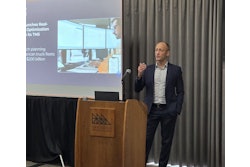While some trucking companies lag behind the AI curve, refusing to accept and adopt it into their organizations, it’s not only here to stay but is becoming a critical element to operations.
Then you have companies like Werner Enterprises that have moved beyond accepting AI to encouraging employees to use and get creative with AI. But even still, companies are restricting its usage to varying degrees with AI policies that outline proper use for employees but primarily focus on agreements with third-party vendors to ensure that the vendors they use aren’t sharing their proprietary data.
Ronnie Thomas, vice president of technology solutions at Werner Enterprises, said that’s because data is king, and if any organization – no matter the industry – doesn’t have an AI policy in place, they should.
“We want to encourage the use of AI in the organization. We have a task force that helps, where people can start to share ideas of how they're using it, and then we have approved tooling for them to use for sharing information where we know that it won't go out into the public models,” Thomas said. “Having that and understanding where and who's using your data and why they're using your data is important, so having those policies in place is key for every organization.”
He said Werner’s tech team has the basics in place within its AI policy, but it is constantly reworking and enhancing it. For example, the company added a security addendum to its policy for third-party vendors that identifies how those vendors can use the company’s data.
Some questions to ask those third-party vendors, Thomas said, include how they utilize your data, where the data is held, how the data is separated and whether it can be used within a generic model.
Steven Hankel, vice president of information technology at 3PL Johanson Transportation Service, said his organization’s main AI policies are about ensuring any AI it uses is not sharing its data outside of its network.
In the fine print of every AI tool could be a clause that allows that third-party provider to leak that data – from emails and documents to software source code – to the public.
“Our primary concern before we let anyone use any AI is the data privacy policy,” Hankel said.
When there is a new AI tool introduced at his company, Hankel said his team creates an education campaign about what’s accessible to employees and works to train them. But what’s accessible is limited, he added, saying the company has “strict controls in place so they can't install software unless it's software that we give to them.”
Jack Smith, IT & Cybersecurity Solutions Architect at Hirschbach Motor Lines, said the refrigerated carrier similarly shares guidance with its employees regarding AI use – what they should and shouldn’t do within provided AI tools.
He said the next step is to put enforcement behind that guidance.
“I won't say I'm completely not governing AI. Definitely, there are tools in play to block certain AI or prevent people from introducing AI into the organization through third party integrations,” Smith said.
He said if unapproved AI is turned on, it’s typically an accident on behalf of an employee who is just trying to do their job. For example, he said Microsoft Teams makes it easy to turn things on that a company may not necessarily approve, and that could expose company data.
“If you can, configure your environment to block or require some level of consent through the process so that people don't accidentally enable a tool,” Smith added.
He said he is currently piloting Microsoft 365 Copilot, which opens the door to all emails and any SharePoint or OneDrive documents. While it is “absolutely amazing” in its ability to mine data and create intelligent responses, Smith said it could be harmful to the organization if someone outside accessed the system.
He also advises fellow trucking companies to build out governance around each tool the organization uses and monitor employee activity on those tools to ensure visibility: what data is accessed, who requested it, and how and where it was accessed. Another idea he added is to have pattern detection that can identify anomalies in data access.
“AI is powerful, but just remember that it's also powerful when the bad guy gets ahold of it,” Smith said.










